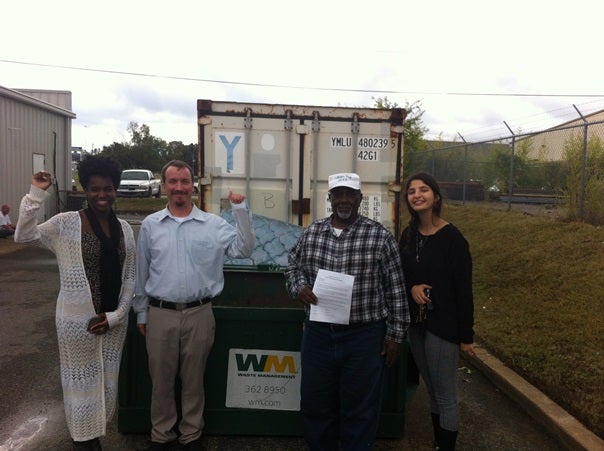News
Sanitation Salvation

Norman Williams, a longtime sanitation worker in Memphis, Tenn., knows the union-busting playbook all too well.
As a 13-year employee at Waste Management Inc. (WMI), the largest for-profit firm in the privatized world that makes up the current U.S. waste industry (commonly known as Big Trash), he has witnessed the company’s vicious anti-union campaigns firsthand—and he has suffered greatly because of it.
Nearly a decade ago, management at Williams’ Memphis WMI facility waged an aggressive, anti-union campaign to convince drivers to vote against their best interests by decertifying Local 667 in Memphis as their bargaining agent.
On several occasions, Williams said the company even flew in top officials for captive audience meetings, forcing the drivers to sit and listen to their false narrative as they painted two very inaccurate pictures of each possible outcome—by voting their union out, they could increase their pay and keep their benefits; by voting to keep their union, they could only lose.
“They told us we would make more under a new incentive program and that only by voting the union out would we be able to keep our same pension and benefits,” Williams said. “I knew better than to trust the company. Unfortunately, a lot of the other drivers got duped by all their lies, especially after they said they would stop matching workers’ 401(k).”
Tensions within the unit quickly grew and the company took full advantage.
Division and Decline
For Williams’ WMI co-worker Ronald Collins, a nine-year roll-off driver at the company, the final nail in the coffin came when the company began pitting commercial drivers and roll-off drivers against one another.
“Once they divided us and drove us apart, it was over. They had the votes they needed to get the Teamsters out. Things went downhill almost immediately,” Collins said.
Following decertification, the company unveiled their highly touted “incentive” program, which proved to be nothing more than a disastrous accountability measure that allowed management to cut the drivers’ hourly wage rates when trucks broke down—a common occurrence at the Memphis facility.
For Williams, the new program was more of a concession plan than an incentive plan—a game of “gotcha,” as he put it.
“If your truck broke down, it was your fault, and on your dime. Every year it became a bigger problem, and every year we lost more money,” he said. “Drivers were losing huge sums of money. My earnings show I earned a total of $20,000 less than when we had a union contract during the last two years.”
Unless drivers cut corners and risked safety, they could only lose money, noted Williams. As a result, turnover increased, causing instability within the workforce.
“Pay went way down and turnover went way up. It was like a revolving door,” he said.
From Wasteland to Graceland
As conditions worsened and frustrations within the unit grew, Williams and Collins quietly began the campaign to re-unionize.
“Once we had majority support, Norman and I reached out to Local 667 to get things started,” Collins said, noting the unit rallied behind the campaign slogan: “Trucks break, we stay broke.”
The 37-worker unit remained strong, uniting against yet another anti-union assault by the company to disrupt the organizing effort.
“They held meetings and brought their top people in from across the country, just like in 2008,” Williams said. “This time we knew better, and we had the community on our side to give us moral support.”
In the weeks leading up to the November vote, the WMI drivers gained public support, raising awareness and adding strength in their fight for justice. After their story appeared in the local paper, they were joined by student activists and campus workers at the University of Memphis, as well as civil rights activists Alvin Turner and Baxter Leach—two of the original strikers from the historic 1968 Memphis sanitation strike.
Commercial drivers and roll-off drivers were finally united, working together as a unit in anticipation for their November vote to become Teamsters again.
Hazardous Warning, Cautionary Tale
Serving as an election monitor on the union side, Williams sat anxiously as his co-workers made their way into the same company trailer—oddly enough, the same venue as their decertification vote nine years before—to cast their ballots for union representation. This time, however, the odds were in the workers’ favor, a decisive margin of victory to rejoin Local 667.
Both Williams and Collins hope their (re)organizing victory will serve as a cautionary tale to workers facing anti-union efforts from their employer.
Both drivers have since become shop stewards for the unit—Williams for commercial drivers, Collins for roll-off drivers—and are currently working alongside Local 667 staff to negotiate a Teamster contract that puts an end to the so-called incentive program and bring drivers fair wages and work rules.
“Sanitation workers perform one of the most dangerous jobs in America, and they deserve union protection,” said Ronnie Parkinson, Secretary-Treasurer of Local 667. “No company should interfere, manipulate or threaten them from voting for protection in the workplace, especially in the waste industry.”
“Memphis has a proud history of standing up for sanitation workers,” said Local 667 Business Agent James Jones. “It was incredible to receive the support of the community throughout the organizing campaign.”